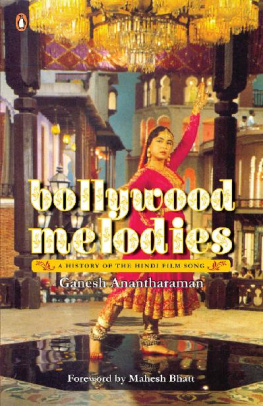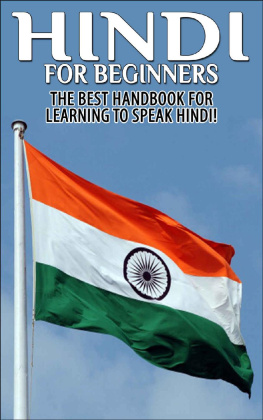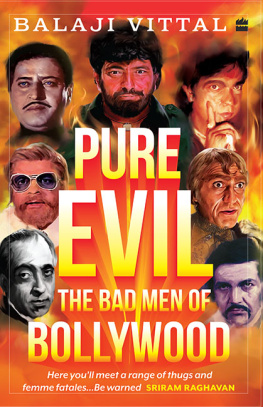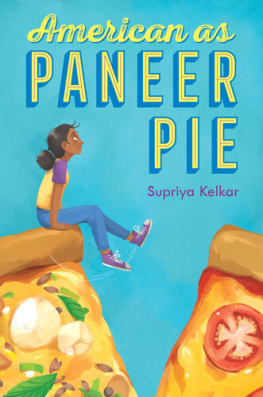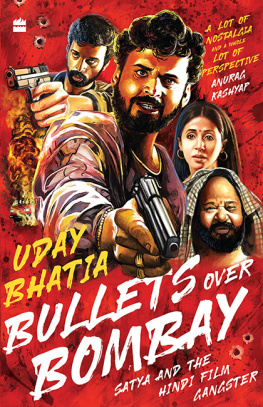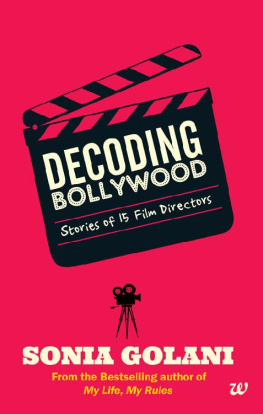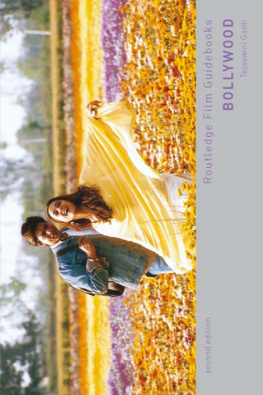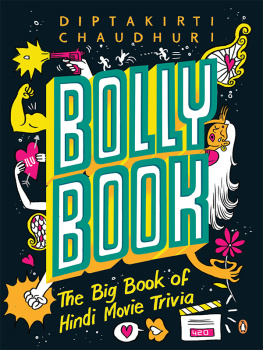Ganesh Anantharaman - Bollywood Melodies: A History of the Hindi Film Song
Here you can read online Ganesh Anantharaman - Bollywood Melodies: A History of the Hindi Film Song full text of the book (entire story) in english for free. Download pdf and epub, get meaning, cover and reviews about this ebook. year: 2008, publisher: Penguin, genre: Non-fiction. Description of the work, (preface) as well as reviews are available. Best literature library LitArk.com created for fans of good reading and offers a wide selection of genres:
Romance novel
Science fiction
Adventure
Detective
Science
History
Home and family
Prose
Art
Politics
Computer
Non-fiction
Religion
Business
Children
Humor
Choose a favorite category and find really read worthwhile books. Enjoy immersion in the world of imagination, feel the emotions of the characters or learn something new for yourself, make an fascinating discovery.
- Book:Bollywood Melodies: A History of the Hindi Film Song
- Author:
- Publisher:Penguin
- Genre:
- Year:2008
- Rating:3 / 5
- Favourites:Add to favourites
- Your mark:
- 60
- 1
- 2
- 3
- 4
- 5
Bollywood Melodies: A History of the Hindi Film Song: summary, description and annotation
We offer to read an annotation, description, summary or preface (depends on what the author of the book "Bollywood Melodies: A History of the Hindi Film Song" wrote himself). If you haven't found the necessary information about the book — write in the comments, we will try to find it.
Bollywood Melodies: A History of the Hindi Film Song — read online for free the complete book (whole text) full work
Below is the text of the book, divided by pages. System saving the place of the last page read, allows you to conveniently read the book "Bollywood Melodies: A History of the Hindi Film Song" online for free, without having to search again every time where you left off. Put a bookmark, and you can go to the page where you finished reading at any time.
Font size:
Interval:
Bookmark:

BOLLYWOOD MELODIES
Ganesh Anantharaman spent the first thirty-two years of his life in Mumbai, where he acquired both his love for film music and an MPhil in political science. He taught that subject at the undergraduate level for six years, before moving on to training and development as his vocation after becoming professional member of the Indian Society for Applied Behavioural Sciences (ISABS) in 1998. He is currently an organization development consultant based in Bangalore, living there with his wife and five-year-old son.

PENGUIN BOOKS
For my parents
T.M. Anantharaman and Lalitha,
for gifting me the love of music
I would like to express my gratitude to the following people for their support at various points of time in writing this book:
My wife Kavitha who encouraged me to pursue my dream of writing this book, managing everything else uncomplainingly during all the months I was completely immersed in it; my son Ananth for gamely putting up with my kind of music being played round the clock; my journalist dad T.M. Anantharaman from whom I drew inspiration to write on music; my mother Lalitha and mother-in-law Padma for their loving understanding of my moods as writer; my colleague and friend Chitra for putting me in touch with Penguin early on; my commissioning editor Udayan Mitra for always being enthusiastic about whatever I wrote; copy editor Shantanu Ray Chaudhuri for his painstaking editing and invaluable suggestions; friends Hersh Kohli and T. Surendar for very patiently finding the contacts of all the Bollywood celebrities featured here; friend Rusi Engineer for giving me a home in Mumbai when I needed it for this book; and film-maker Mahesh Bhatt for generously agreeing to write a foreword.
M usic surrounds us. And we Indians wouldnt have it any other way, would we? If you are an Indian and have been exposed to Hindi film music, just pause and look back through the mists of time, and you will discover that there is a tune buried somewhere in your consciousness which kick-started your first love affair. Without Bollywood melodies how would you have coped with those exhilarating and restless nights and days when you felt the first stirrings of attraction and passion? How would you have dealt with your achy breaky heart without the haunting melodies of love and betrayal sung by the icons of yesteryears like Mukesh, Rafi and the inimitable Kishore Kumar?
Dont you think its time for you to raise a toast to a Sahir Ludhianvi or a Kaifi Azmi for giving you those life-altering insights that helped you grow from a boy to a young man? To acknowledge that the edge of the intense loneliness you felt was blunted by the soul-stirring melodies of ShankerJaikishan, Naushad, Madan Mohan and LaxmikantPyarelal? Whether you have lived through the 1940s, 1950s, 1960s or are a new millennium youngster, there is no getting away from the inescapable fact that without Bollywood music, your life would have been so much more parched and colourless. So, for those who want to revisit those times in their lives, this book by Ganesh Anantharaman, Bollywood Melodies: A History of the Hindi Film Song, is a true gem.
As I flipped through the first few pages of this work of love and nostalgia that this young writer has put together, it hurled me back into the pages of history where I was thrown into intimate contact with the works of icons of every age, who have pulled out jewels from their hearts and scattered them through the sands of time. It was akin to taking a sepia-tinted journey through those glorious watershed years of Hindi film music.
It was whilst reading about the 1930s, which was the era when the studios ruled, that I not only discovered that the first Hindi film song to be recorded in Indian cinema was from Alam Ara in the year 1931, but also something about my own genesis. The 1930s was the era when the talkies began and that in turn gave birth to the film song. And it was in the 1930s that my father came to Bombay, became a sound engineer and met my mother, who was an actress, which resulted in my birth nineteen years later in free India!
In my growing years, the highbrows who prescribed what is culturally correct looked down on Bollywood melodies. Those were the days when only classical music played on All India Radio and one had to tune into Radio Ceylon to listen to Ameen Sayani who would give us a sample of the Bollywood chartbusters every week in Binaca Geetmala. Those were the days when I would play huge LPs for my mother on a hand-operated old-fashioned gramophone, which you may find in Chor Bazaars antique shops now. So much has changed since then! Today, my maid listens to music on her cellphone while washing the dishes, and FM Radio and TV programmes are making a killing selling Bollywood melodies.
But alas, as Ganesh laments, somewhere in the mid-1980s the Hindi film song started to lose its Indianness, and it was only in the early 1990s with movies such as Aashiqui, Dil Hain Ki Maanta Nahin and Saajan, and the arrival of NadeemShravan, that there was a return to the intrinsic Indian melody. Its amazing that, in spite of being an outsider, and an organization development consultant to boot, Ganesh has been able to view the spectrum of the music industrys journey with such clarity and insight.
One of the most fascinating chapters of this book is his interview with Lata Mangeshkar, in which she talks about her childhood days when she was exposed to the music of Saigal. Noorjehan was her favourite among the female singing stars, and it was from her that she learnt the significance of Urdu diction. It is fascinating to read the nightingale of India emphasizing how critical it is for a singer to be able to articulate the words of a song in order for it to leave its true impact. And then in closing, she goes to the heart of the problem of our times when she says that it is the need for instant success today that has resulted in the disintegration of music. She minces no words when she states that it is because the Indian landscape today is bereft of mentors of the likes of Ghulam Haider, Anil Biswas and Naushad, under whom she had the privilege to study, that music has become so soulless and mindless. She clearly says it is not because the singers are less talented but because of the lack of composers today that we dont have music that endures. Ganesh needs to be applauded for getting the gentle and generous Lata to make such definitive and insightful comments and suggest ways to the practitioners of Indian film music to bail them out of this sterile phase that they are stuck in.
Remembering the past may seem like a mindless indulgence in nostalgia to many. There is no denying that the past is a collection of shadowed memories. Nonetheless these memories can help many of us connect with our lost heritage and help us shape our future. At times it is necessary for one to go back if one wants to go forward. The past chronicled in Ganeshs book can provide us with material for creating new tunes and weaving new myths. There is a magical there yonder that will reveal itself if you look hard enough in the rear-view mirror of the past. Ganeshs book plays the part of that rear-view mirror. Come gaze into it.
Font size:
Interval:
Bookmark:
Similar books «Bollywood Melodies: A History of the Hindi Film Song»
Look at similar books to Bollywood Melodies: A History of the Hindi Film Song. We have selected literature similar in name and meaning in the hope of providing readers with more options to find new, interesting, not yet read works.
Discussion, reviews of the book Bollywood Melodies: A History of the Hindi Film Song and just readers' own opinions. Leave your comments, write what you think about the work, its meaning or the main characters. Specify what exactly you liked and what you didn't like, and why you think so.

